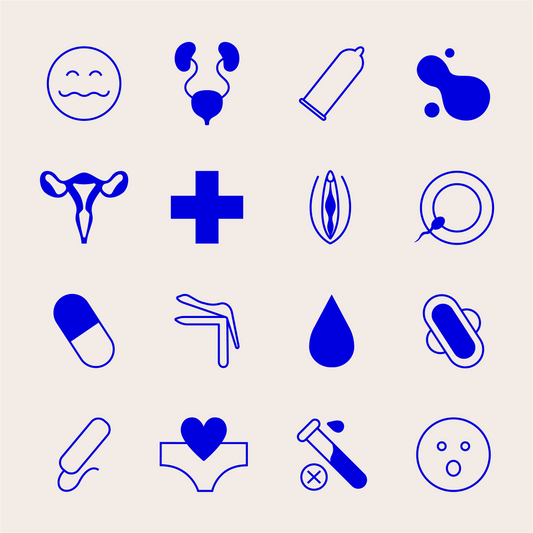Alexandra Fine, Credentialed Sexologist, M. Psych | Written by Dame
Overcoming the Taboos of Masturbation | Masturbation and Health Benefits | Masturbation and Sexual Health Benefits
There are many reasons why people masturbate.
Of course, they may be teenagers (or young adults) just discovering their sexuality.
But those who have “graduated” to adulthood may masturbate when they don’t have ready access to sex partners because they’re widowed, divorced or disabled. Or they’re simply single, by choice or circumstance.
They may masturbate because their spouse or committed partner is temporarily or permanently unable to participate in sexual activities, or no longer interested in them. Or it could be that their partner isn’t interested in having sex as often as they are.
They may masturbate because they’re traveling without their regular sex partners, or because they’re in isolation for some reason (hello, COVID!) or because they’re in prison.
Or – and this may come as a shock – they may just masturbate because it relieves sexual tension and feels so damn good. In fact, they may masturbate with a partner.
Many of those people will only satisfy themselves in private, because of the residual guilt or shame that’s unfortunately often associated with masturbation. Others who are less inhibited may feel free to enjoy themselves in front of a partner, or engage with them in mutual masturbation.
No matter where, when or why people masturbate, however, they all have one important thing in common – other than enjoying sexual pleasure.
They’re improving their physical and sexual health and wellness when they masturbate.
Let’s dig into the history and the science.
Overcoming the Taboos of Masturbation
Before people can enjoy some of the benefits of masturbation, they must feel good about doing it. That can be difficult. Modern civilization considered self-satisfaction taboo or forbidden for hundreds of years, and even today, many still feel at least some guilt or shame when they masturbate.
Where do those feelings come from, and why are they still an obstacle?
In some ancient cultures, self-gratification was fully accepted as a normal sexual activity; in fact, it’s even portrayed in some prehistoric cave paintings. The Egyptian and Greek cultures embraced masturbation, and in some lesser known societies it has been celebrated as a rite of passage.
But the spread of Christianity and the development of Western cultures changed things drastically for the modern world.
Many religions, most notably the Catholic Church, strictly forbade masturbation. Modern Catholic theology still teaches that self-pleasuring is a sin, as do Mormonism and mainstream Islam. Most Protestant denominations which originally condemned masturbation have moderated their views in recent years, usually by reinterpreting what was originally viewed as the Biblical prohibition of “spilling seed on the Earth.”
Prevailing religious views on masturbation during the 18th and 19th century had a major effect on the way that cultural and political leaders, and even physicians, saw the practice. A few of the most important declarations summarizing popular views on masturbation during this time came from German philosopher Immanuel Kant; from British doctor Robert James, the author of the well-regarded 1745 Medicinal Dictionary and the inventor of a popular “fever powder” of the day; and from French psychiatrist Jean Esquirol, author of the 1838 publication Des Maladies Mentales (Mental Illnesses).
Among other views that seem unbelievable today, Kant described masturbation as “a violation of one’s duty to himself,” and James called masturbation a sin that produced “…the most deplorable and generally incurable disorders.” Esquirol’s simple summary of masturbation? It was “recognized in all countries as a cause of insanity.” And conventional wisdom held that satisfying yourself could cause both infertility and impotence.
Cultural recommendations and medical prescriptions meant to discourage masturbation, described more charitably as “preventing self-abuse,” were common during this period. Some of them were eating a bland diet (promoted by, among others, doctor and nutritionist John Harvey Kellogg, who also invented Corn Flakes), chastity belts, and even surgeries to remove foreskins and clitorises. Other doctors described “female masturbation” as a symptom of “hysteria,” and performed “therapeutic massages” with rudimentary vibrators right in their own offices.
The 20th century finally saw a shift in attitudes. It was highlighted by the work of sexologist Alfred Kinsey in the 1948 and 1953 Kinsey Reports, which found that more than 90% of American men and 62% of American women had masturbated during their lives – and concluded that masturbation was an instinctual and natural behavior. And by 1968, self-pleasuring was no longer considered a “diagnosable” illness in the authoritative Diagnostic and Statistical Manual of Mental Disorders (DSM-II).
Destigmatizing masturbation took quite a while and still hasn’t been fully accomplished. Some religions preach the evils of masturbation today, and many children grow up fearful or ashamed of self-exploration because of over-the-top negative lectures and reactions from well-intentioned but mistaken parents.
The continuing legitimization of masturbation as a normal sexual behavior is only the first step. The next: non-judgmental scientific research into its effects, which has been ongoing for decades. As it turns out, that research shows there are actually many benefits of masturbation which go well beyond the simple relief of sexual tension.
Masturbation and Health Benefits
The first few “health and wellness” justifications for masturbation that we’ll be listing might seem obvious. The rest may not, but they’re supported by peer-reviewed medical studies which explain why self-pleasuring can be very good for your health.
(One caveat before we start: this article should not be considered medical advice. If you have any questions or concerns about how masturbation affects your physical or mental health, please speak with a healthcare professional.)
Masturbation is Good Exercise
You certainly won’t drop 25 pounds just by adding masturbation into your regular workout routine, but self-pleasuring is good exercise. And as long as you reach climax, it’s almost as effective as a strenuous session in the sack.
Let’s start with a major study published in the British Medical Journal after two decades of research. It concluded that the more orgasms that penis-havers experience (whether from masturbation or penetrative sex), the longer they are likely to live and the better quality of life they experience. It also determined that sexual activity is not likely to cause strokes or heart disease.
That confirms findings published in the American Journal of Cardiology, which explain why masturbation and sexual intercourse are good for heart health. The “sexual exercise” produces an increase in heart rate and blood flow, just as cardio exercise does. That leads to improved circulation, reducing the risks of cardiovascular disease and heart attacks. It may even help prevent weight gain and the development of type-2 diabetes. Studies also show that having regular orgasms can lead to lower blood pressure, another indicator of heart health.
Masturbation May Boost Immunity and Mood, Decrease Stress and Help You Sleep
There’s a good chance you already knew about at least one of these benefits from personal experience. You just probably don’t know the reasons behind them.
Whenever you orgasm, whether it’s from masturbation or other types of sex play, your body releases endorphins, serotonin, dopamine, prolactin and oxytocin – a wealth of “feel good” hormones which don’t just make you feel good, they also relax you and enhance feelings of well-being. That makes it easier to fall into a deep and restful sleep.
Oxytocin (sometimes called the “cuddle hormone”) provides another benefit when it’s released during orgasm. It lowers the body’s level of cortisol, a steroid hormone (the “stress hormone”) which suppresses the immune system when there’s too much of it in the body. Lowered cortisol levels may improve heart health as well.
One more study shows another reason why self-satisfaction may boost immunity. Masturbation increases the number of leukocytes (the fancy name for white blood cells) in the body. As you undoubtedly know, white blood cells are keys to the immune system’s ability to protect against infections.
Masturbation May Help Ease Chronic Pain
We could have included this in the last section, but pain is such an important issue for many patients that we decided pain control deserved its own, separate mention.
Oxytocin, along with vasopressin, dopamine and endorphins, have shown great promise in the treatment of chronic and deep tissue pain. The release of those hormones is why many feel relief after masturbating to orgasm; the hormones don’t just boost mood, but actually reduce pain as well.
Masturbation Can Help Ease Menstrual Cramps
Not every vulva-haver wants to masturbate – or do anything else sex-related – when they’re having their period. However, many who do satisfy themselves during menstruation find that it can relieve painful cramping. One reason is the release of feel-good hormones like serotonin and dopamine that we’ve already discussed. The other is that climaxing causes uterine muscles to first contract but then release, increasing blood flow to the uterus and easing cramps.
Masturbation and Sexual Health Benefits
We assume that no elaboration is necessary when discussing the number-one sexual benefit of masturbation: the way it makes you feel when you climax.
There are lesser-known benefits, though, when it comes to sexual health and wellness. We’ll start with the benefits that penis owners can enjoy from regular self-pleasuring, but we’ll get to vulva owners shortly.
Masturbation May Prevent Erectile Dysfunction
A five-year study followed the sexual health of nearly one thousand elderly penis-havers, and found that those who had sex less than once per week were twice as likely to develop erectile dysfunction – and the more sex the participants had, the less the risk of ED they faced.
The research focused on penetrative sex but sexuality educators say the conclusions also apply to masturbation, because the key contributor to erectile health is regular and sufficient blood flow to the genitals.
Masturbation May Prevent Prostate Cancer
Research into prostate cancer conducted at the National Cancer Institute and published in the Journal of the American Medical Association discovered a very important link between sex and prostate health: the risk of developing that form of cancer appears to be lower with frequent ejaculation.
The study didn’t distinguish between types of sexual activity. The conclusion, though, is that whether it’s due to penetrative sex, masturbation or even nocturnal emissions, the more frequently a penis-haver climaxes, the lower their risk of prostate cancer. It’s not yet clear exactly why that happens, but some theorize that ejaculation flushes potential cancer-causing agents out of the reproductive system.
Masturbation Can Help Strengthen Pelvic Floor Muscles
This benefit can apply to all genders, but should be particularly interesting to vulva-havers. The muscles in the pelvic floor work to keep the spine stable, while physically supporting the bladder and bowel (as well as the uterus in those who have one).
Pelvic floor muscles are crucial for a number of reasons. The most important are bowel and bladder control, recovery from abdominal surgery and childbirth. But there’s another reason, too; they’re largely responsible for the strength and stamina required for great sex.
Since these muscles are connected to many other muscles in the core, they help provide body strength and stability. However, a weak pelvic floor can force the body to overwork those other muscles, frequently leading to lower back, hip and leg pain. Pelvic floor muscle exercises, like Kegels, are frequently recommended for those experiencing urinary incontinence, those suffering from bowel issues, and those who are pregnant.
You can probably guess what else helps to strengthen pelvic floor muscles: masturbation. The muscle contractions that happen during orgasm are great for strengthening the pelvic floor, meaning sexual activities can last longer and be more intense.
Masturbation Is Safe Sex
We probably don’t have to point out that there’s no chance of pregnancy, or transmittal of STDs or sexually-transmitted infections, if you’re only playing with your own body. And the risk is only slightly greater if you’re engaged in mutual masturbation with a partner, as long as you’re careful with ejaculate and don’t share sex toys (or if you clean them carefully before a partner uses them).
Masturbation provides an additional benefit when it comes to STIs and other types of infections. Those with vulvas may know that their vagina expands during penetrative sex, creating more space and moving the cervix deeper into the vagina. This is known as cervical “tenting” – and it also happens when you masturbate. Why is that important? Tenting is believed to lower the chance of contracting urinary tract and cervical infections.
Masturbation Can Help With Painful Sex
Low estrogen levels often cause vaginal dryness, which may be a serious problem for those approaching and in menopause. Over-the-counter and prescription products can help with the issue – but so can masturbation, since the increased blood flow it creates in the vagina stimulates natural lubrication.
Masturbation Can Contribute to a Better Sex Life
There’s one major reason why many people believe that sex gets better as they get older: they’re more familiar with their body and what makes them feel good. And one of the best ways to learn about your erogenous zones, sexual triggers, likes and dislikes is to explore your body through masturbation in the privacy of your own bedroom (or other favorite spot). Think of it as sexual self-care.
When (or if) you’re comfortable enough to try mutual masturbation, whether it’s side-by-side with a partner or with each of you satisfying the other, those lessons will allow each of you to share the information that you’ve learned about your bodies – leading to better and more satisfying sexual pleasure.
There’s one related benefit that can come from mutual masturbation: a boost in self-esteem. As we’ve mentioned, many people still feel residual guilt from childhood or societal judgments, or erroneous information they’ve heard about masturbation.
Additionally, some may have experienced and internalized guilt or shame if they’ve found out that a partner was masturbating “outside of the relationship,” and assumed that they were unable to satisfy the partner on their own. Similar guilt can develop in people who masturbate on their own without a partner’s knowledge.
Mutual masturbation, though, allows both partners to overcome those feelings that they’re “not enough” to satisfy the other, while also letting them explore and understand each others’ bodies more completely than ever. If desired, it can even include kinkier sexual elements like dominance and submission.
In any event, masturbating with a partner can replace any existing guilt or shame with self- assuredness and confidence – both in yourself and in your partner – while maximizing sexual pleasure at the same time, with no sex therapist required.
Sounds like a pretty good deal.




















































